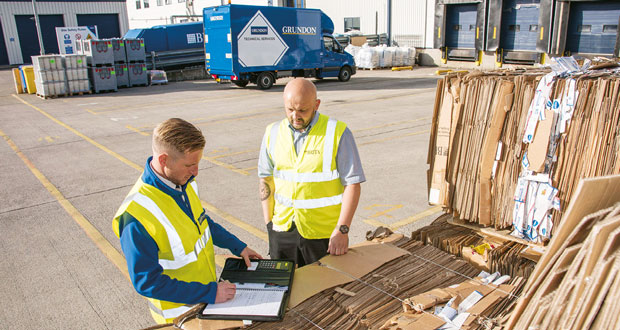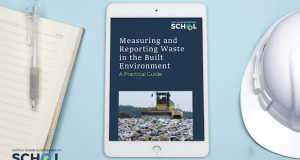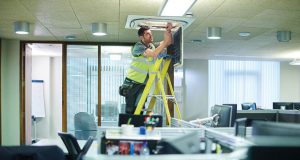Transparency is key as FMs put environmental targets above compliance, finds the latest Waste Management Survey, carried out by FMJ in partnership with Grundon Waste Management
Managing waste and recycling has topped the table of priorities for facilities managers for the fifth year in a row, according to latest survey results of an exclusive survey undertaken by FMJ in partnership with Grundon Waste Management. Carried out every year since 2018, it is recognised as a benchmark in highlighting the topics and challenges that FMs face on a daily basis.
According to the results, now more than ever, when making a decision about managing their waste, FMs are demanding greater transparency in terms of how waste is treated and they are putting increased emphasis on understanding a waste provider’s commitment to environmental issues.
At the same time, FMs believe their role in contributing to an organisation’s environmental targets is now more important than compliance – which has slipped out of the top three topics. Nearly a third said they were now less concerned about the risk of non-compliance with regulations than they were previously.
 A higher than ever percentage (92.63 per cent) of respondents now say they believe their role actively mitigates reputational or financial risk, and Owen George, Grundon’s Divisional Commercial & Resource Strategy Manager, says it shows FMs are looking for even greater support to meet sustainability goals.
A higher than ever percentage (92.63 per cent) of respondents now say they believe their role actively mitigates reputational or financial risk, and Owen George, Grundon’s Divisional Commercial & Resource Strategy Manager, says it shows FMs are looking for even greater support to meet sustainability goals.
“I think what we’re really seeing is that a lot of FMs now see compliance as a given as they know they are dealing with bona fide waste companies who are compliant with the fundamental elements, such as waste carriers notes and duty of care documentation,” he says.
“I also think waste management companies have become a lot better in explaining waste management and recycling processes, so FMs have the comfort of knowing what is happening to their waste now.
“In terms of needing to hit environmental targets, the emphasis that businesses are putting on facilities managers, who typically have responsibility for utilities and waste and all the things that generate carbon, is that we all need to be doing a lot more.
“We are seeing companies come to us with new recycling materials and novel packaging materials, or they are asking us about how we collect our waste, for example if we are using electric or hydrogen vehicles.
“I think the big pressure they’re facing is how are they going to reduce their organisation’s carbon footprint in a meaningful way. In turn, we need to be able to demonstrate that we are playing our part in this overall climate challenge.”
A typical example of this would be Grundon’s own fleet of waste vehicles which is certified CarbonNeutral®, meaning waste collections don’t impact on customers’ own carbon footprint.
ENVIRONMENTAL ISSUES
Encouragingly, an increasing number of FMs now say they are now required to produce environmental reports. When the survey was first undertaken in 2018, only 50 per cent said this was part of their role, but for the last two years the figure has hovered around 80 per cent.
When it comes to the most important aspects of an FM’s role, over 45 per cent of respondents say contribution to environmental targets is their number one priority, closely followed by service delivery and return on investment.
 Grundon’s Jack Yarrow, Regional Sales Manager, says customers want to work with businesses who can help push recycling up the waste hierarchy and bring in new ideas, such as, “our Paper Cup Recycling Service, which enables paper cups to be 100 per cent recycled at specialist facilities.
Grundon’s Jack Yarrow, Regional Sales Manager, says customers want to work with businesses who can help push recycling up the waste hierarchy and bring in new ideas, such as, “our Paper Cup Recycling Service, which enables paper cups to be 100 per cent recycled at specialist facilities.
“What we’re seeing is customers who want to think outside the box in ways to increase their recycling,” he said. “It’s about waste audits – identifying opportunities for segregating out new waste streams from the general waste bins – using new technology to recycle those materials and, depending on the volumes created, to potentially then offer customers rebates in return.
“Customers are no longer content to aim for 50 per cent recycling, they are now looking at 70-80 per cent recycling levels and our employee education programmes and awareness days are a critical part of working towards these achievements.
“We’re also working hard to make sure that these events are not just a tick box exercise where people think they can turn up, get a freebie and walk away again. It really is an education programme focusing on driving the recycling message and helping employees to understand that when they come to work, they cannot abdicate responsibility for what they do with their waste.”
Inability to engage staff is continually seen as the number one barrier to successfully increasing recycling levels, followed by physical restrictions, such as the lack of space for bins, compactors and other equipment.





